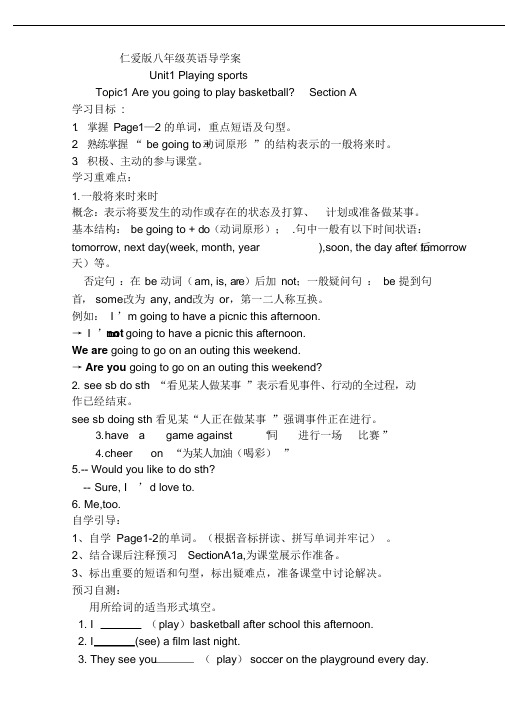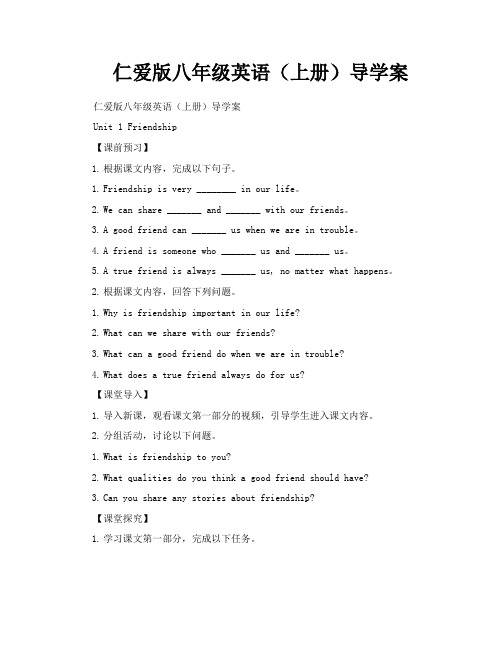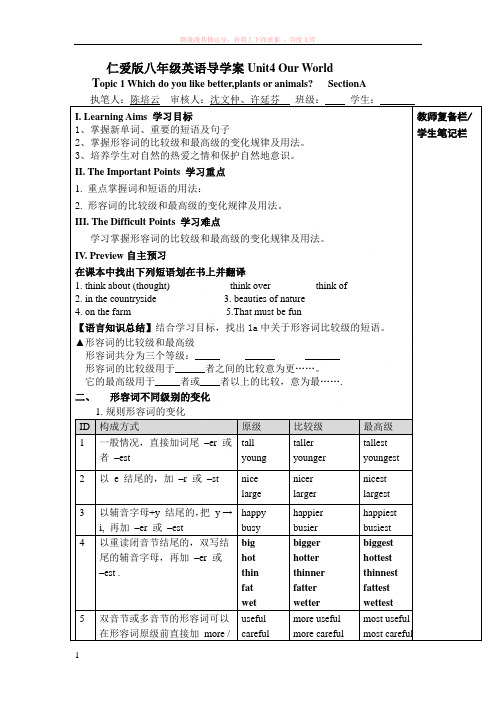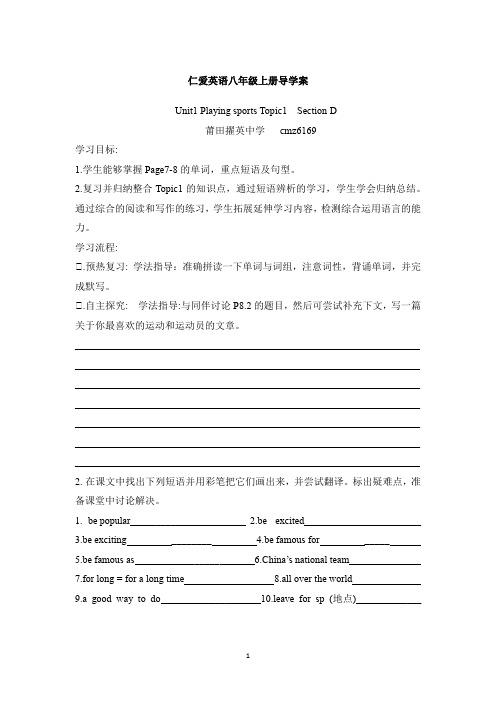仁爱英语八年级上册英语导学案
仁爱版八年级英语上册导学案(全册)

仁爱版八年级英语导学案Unit1 Playing sportsTopic1 Are you going to play basketball? Section A学习目标:1.掌握Page1—2 的单词,重点短语及句型。
2.熟练掌握“be going to 动+词原形”的结构表示的一般将来时。
3.积极、主动的参与课堂。
学习重难点:1. 一般将来时来时概念:表示将要发生的动作或存在的状态及打算、计划或准备做某事。
基本结构:be going to + do(动词原形);.句中一般有以下时间状语:后t omorrow tomorrow, next day(week, month, year ),soon, the day afte(r天)等。
否定句:在be 动词(a m, is, are)后加not;一般疑问句:be 提到句首,some改为any, and改为or,第一二人称互换。
例如:I ’m going to have a picnic this afternoon.→I ’n m ot going to have a picnic this afternoon.We are going to go on an outing this weekend.→Are you going to go on an outing this weekend?2. see sb do sth “看见某人做某事”表示看见事件、行动的全过程,动作已经结束。
see sb doing sth 看见某“人正在做某事”强调事件正在进行。
3. have a game against “同进行一场比赛”4. cheer on “为某人加油(喝彩)”5.-- Would you like to do sth?-- Sure, I ’d love to.6. Me,too.自学引导:1、自学Page1-2的单词。
(根据音标拼读、拼写单词并牢记)。
仁爱版八年级英语(上册)导学案

仁爱版八年级英语(上册)导学案仁爱版八年级英语(上册)导学案Unit 1 Friendship【课前预习】1.根据课文内容,完成以下句子。
1.Friendship is very ________ in our life。
2.We can share _______ and _______ with our friends。
3.A good friend can _______ us when we are in trouble。
4.A friend is someone who _______ us and _______ us。
5.A true friend is always _______ us, no matter what happens。
2.根据课文内容,回答下列问题。
1.Why is friendship important in our life?2.What can we share with our friends?3.What can a good friend do when we are in trouble?4.What does a true friend always do for us?【课堂导入】1.导入新课,观看课文第一部分的视频,引导学生进入课文内容。
2.分组活动,讨论以下问题。
1.What is friendship to you?2.What qualities do you think a good friend should have?3.Can you share any stories about friendship?【课堂探究】1.学习课文第一部分,完成以下任务。
1.阅读课文第一部分,并完成下面的练习。
a) 用自己的话总结出这部分的主要内容。
b) 在文中找出表示原因的句子,并写出原因。
c) 找出文中的两个意思相同的词组。
2.配对合作,完成课本练习。
八年级上册仁爱英语优秀导学案Unit1-Topic2-SectionB部分

2019-2020学年上期活动单导学案仁爱版英语八年级(上)主笔人:肖乃福校审人:使用人:【教学内容】Unit1-Topic2-Section B【教学目标】1.学习新单词与短语: fight,nothing,finish,teamwork,shout at,beangry with,talk about.;2.掌握重点短语及句型及语法。
【教学重难点】1.用I’m sorry for what I said表达抱歉;2.双宾语结构【知识点呈现】1.lose→lost lose one’s way=be lost =get lost 迷路、丢失2.would 情态v.(一定)eg:That would be very well.3.mean(meant)用法:①意味着;②意思;eg:the meaning of..4.shout at sb. 对某人大喊大叫shout→shouted5.fight→fought 短语:fight with sb.=have a fight with sb.6.do/try one’s best尽某人最大努力,do/try one’s best to do sth.尽某人最大努力做某事7.be angry with sb. 生某人的气8.talk with sb. talk to sb.9.What about doing sth.?10.say sorry/thanks/goodbye/bye/hello/hi to sb. 对某人说抱歉/谢谢/再见/你好11.be sorry +(that)+句子抱歉…be sorry for sth. 因…而抱歉12.fun.①乐趣(不可数)have fun in doing sth.在做某事方面有乐趣;②adj.有乐趣的【重点句子】(1) Don’t be angry with each other.(2) Michael doesn’t do well in soccer but he did his best.(3) Keep trying.(4) What about saying sorry to Michael?(5) I’m sorry for what I said.(6) You are sure to have more fun.……【重点语法】双宾语结构:Subject+vt.+间接宾语+直接宾语①pass sb. sth.= pass sth. to sb.②throw sb. sth.= throw sth. to sb.③buy sb. sth.= buy sth. for sb.④make sb. sth.= make sth. for sb.⑤bring sb. sth.= bring sth. to/for sb.⑥give sb. sth.= give sth. to sb.……【教后反思】___________________________________________________________ ___________________________________________________________ __________________________________________________________ __________________________________________________________。
仁爱英语八年级上Unit1Topic2SectionA.B导学案

Unit1 Topic2导学案编写人:审核人:班级:姓名:Unit1 Topic2 Section A一、导学目标1.学习本课单词和词组2.学习提出要求的句型Would you mind (not) doing sth.?/Will you …?及其答语。
二、导学重难点句型Would you mind (not) doing sth.?三、自主学习1. 把下列短语译成汉语。
have a soccer game _____________ one of ________________fall ill ________________ never mind ________________keep trying__________________ give sb. a hand________________do well in________________2.把下列句子译成汉语。
(1)We are going to have a soccer game against Class Five on Saturday.(2)But one of my teammates fell ill.(3)Would you mind teaching me?Not at all.注释:Would you mind……?(1)Would you mind teaching me? = Would you please teach me? 你教我好吗?Would you mind (not) doing sth? 表示“(不)做某事介意/好吗?”Would/Do you mind …?你介意…吗?/请你…好吗?Would/Do you mind +doing…?用来客气地提出请求Would/Do you mind not doing…你不做…行吗?Would/Do you mind+if +从句?如果…你介意吗?Would/Do you mind giving me a glass of water? 请你给我一杯水好吗?Would/Do you mind not smoking? 你别抽烟好吗?Do you mind if I smoke? 你意我抽烟吗?(2)回答带有mind的问句时要注意yes或no都是针对mind(介意,在乎)选用的。
仁爱英语八上导学案

Unit 1 Playing SportsThe school sports meet is coming.Section A导学案Teaching objectives: talk about school sports meet.the future tense with “will”.Key points : Objective1&2Difficult point: Objective2Step1 导入Lead inLet's talkWhat are you going to do this weekend?Why ?Great! I will come to cheer you on!Will you take part in it?Step2 呈现Presentation Phrases &Sentences1为某人加油2参加,加入某项活动(三种)3 跳高4跳远5为…做准备6接力赛7一双跑步鞋8谈论某事9某人第一次做某事 1 0运动会11男子800米赛跑12与某人交朋友13校园运动会将要来了。
14你将会参加哪一项运动会?男子800米赛跑。
15我将会参加跳高和跳远。
16这是我第一次参加跳高比赛。
Step3 DiscussPractice 1a with your partnerDiscuss in groups and make a survey.Will you take part in school sports meet? What will you do ? Why?1.the sports meet/meeting运动会the boys' 800一meter race男子800米赛跑the long jump跳远the high jump跳高the relay race接力赛跑2.It's the/one's first/second/…time to do sth.3.make friends with sb.与某人交朋友。
仁爱版八年级上英语导学案

仁爱版八年级英语导学案Unit4 Our WorldT opic 1 Which do you like better,plants or animals? SectionA执笔人:陈培云审核人:沈文仲、许延芬班级:学生:I. Learning Aims学习目标1、掌握新单词、重要的短语及句子2、掌握形容词的比较级和最高级的变化规律及用法。
3、培养学生对自然的热爱之情和保护自然地意识。
II. The Important Points 学习重点1. 重点掌握词和短语的用法:2. 形容词的比较级和最高级的变化规律及用法。
III. The Difficult Points 学习难点学习掌握形容词的比较级和最高级的变化规律及用法。
IV. Preview自主预习在课本中找出下列短语划在书上并翻译1. think about (thought)____________think over ________ think of ___________2. in the countryside _____________3. beauties of nature _________4. on the farm __________________5.That must be fun _________【语言知识总结】结合学习目标,找出1a中关于形容词比较级的短语。
▲形容词的比较级和最高级形容词共分为三个等级:_____ ______ _______形容词的比较级用于______者之间的比较意为更……。
它的最高级用于_____者或____者以上的比较,意为最…….二、形容词不同级别的变化1. 规则形容词的变化ID 构成方式原级比较级最高级1 一般情况,直接加词尾–er 或者–est tallyoungtalleryoungertallestyoungest2 以e 结尾的,加–r 或–st nicelarge nicerlargernicestlargest3 以辅音字母+y 结尾的,把y →i, 再加–er 或–est happybusyhappierbusierhappiestbusiest4 以重读闭音节结尾的,双写结尾的辅音字母,再加–er 或–est . bighotthinfatwetbiggerhotterthinnerfatterwetterbiggesthottestthinnestfattestwettest5 双音节或多音节的形容词可以在形容词原级前直接加more / usefulcarefulmore usefulmore carefulmost usefulmost careful教师复备栏/学生笔记栏less或most / least 构成形容词的比较级和最高级difficultexpensivemore difficultless expensivemost difficultleast expensive2. 不规则形容词的变化ID 原级比较级最高级1 good/well好的better best2 bad/ill坏的/ 病的worse worst3 many/much许多more most4 Little小的/少数一点less least5 far farther更远(表示路程,further更进一步(表示程度)farthest , furthest6 old older更老的/更旧的, elder更年长的oldest , eldest 补充用于不可数名词用于可数名词表示多muchmorethe most many more the most表示少littlelessthe least few fewerthe fewest▲think about 思考、考虑【链接】⑴think over = think about … carefully 仔细考虑…好好想想,你就会有个好主意。
仁爱英语八年级上册导学案Unit1 Topic1 Section B

仁爱英语八年级上册导学案Unit1 Playing sports Topic1 Section B莆田擢英中学cmz6169学习目标:1.学生能够掌握Page3-4的单词,重点短语及句型。
2.学生正确地运用be going to be的句型谈论有关自己和他人的运动爱好及梦想的话题,并能用书面形式写出自己的梦想及运动爱好。
学习流程:Ⅰ.预热复习:学法指导:准确拼读一下单词与词组,注意词性,背诵单词,并完成默写。
Ⅰ.自主探究: 学法指导: 1. 头脑风暴,请在横线上写出你所知道的有关职业的单词。
_____________________________________________________________________ _____________________________________________________________________ _____________________________________________________________________ 2.在课文中找出下列短语并用彩笔把它们画出来,并尝试翻译。
标出疑难点,准备课堂中讨论解决。
1.your favorite player2. 2.26 meters tall3.grow up4. play for5.in the future6.like...bestⅠ.合作交流:学法指导:1.与同伴运用What’s your favorite....?谈论运动爱好。
2.与同伴运用What are you going to be when you grow up?讨论梦想。
3.运用本课所学语言,并能用书面形式写出自己和他人的梦想及运动爱好。
_____________________________________________________________________ _____________________________________________________________________ _____________________________________________________________________ _____________________________________________________________________IV. 课文要点提示及拓展1. favorite 可作形容词,意思为“最喜爱的”,e.g. Luxun is my favorite writer.也可以作名词,意思为“最喜爱的人或物”,English is my favotite.2.与how构成的疑问词有:How tall(身高)多高; how high(山)多高;how heavy多重;how long 多长;How wide 多宽;how deep 多深;how old 多大…. (how + adj.)对应的回答常用“数词+量词+形容词”,如:1.70 meters tall; 2 kilometers high; 3 kilos heavy; 20 years old扩展:a two-year-old boy,由连词符构成的合成形容词作定语时名词不用变复数。
仁爱英语八年级上册导学案Unit1 Topic1 Section D

仁爱英语八年级上册导学案Unit1 Playing sports Topic1 Section D莆田擢英中学cmz6169学习目标:1.学生能够掌握Page7-8的单词,重点短语及句型。
2.复习并归纳整合Topic1的知识点,通过短语辨析的学习,学生学会归纳总结。
通过综合的阅读和写作的练习,学生拓展延伸学习内容,检测综合运用语言的能力。
学习流程:Ⅰ.预热复习: 学法指导:准确拼读一下单词与词组,注意词性,背诵单词,并完成默写。
Ⅰ.自主探究: 学法指导:与同伴讨论P8.2的题目,然后可尝试补充下文,写一篇关于你最喜欢的运动和运动员的文章。
_____________________________________________________________________ _____________________________________________________________________ _____________________________________________________________________ _____________________________________________________________________ _____________________________________________________________________ _____________________________________________________________________ _____________________________________________________________________ 2.在课文中找出下列短语并用彩笔把它们画出来,并尝试翻译。
标出疑难点,准备课堂中讨论解决。
1.be popular _____2.be excited ________3.be exciting ________4.be famous for _____5.be famous as ______6.China’s national team7.for long = for a long time 8.all over the world9.a good way to do ___ 10.leave for sp (地点) ___Ⅰ.合作交流:学法指导::如果让你安排一下周末计划,你会从哪些方面进行安排呢?动动脑筋,参考P8的Project完成以下mind map。
- 1、下载文档前请自行甄别文档内容的完整性,平台不提供额外的编辑、内容补充、找答案等附加服务。
- 2、"仅部分预览"的文档,不可在线预览部分如存在完整性等问题,可反馈申请退款(可完整预览的文档不适用该条件!)。
- 3、如文档侵犯您的权益,请联系客服反馈,我们会尽快为您处理(人工客服工作时间:9:00-18:30)。
仁爱英语八年级上册英语导学案(官方版)Unit 1 Topic 1 Are you going to play basketball?Section A一、学习目标Aims and demands1、Learn some new words and phrases;2、Learn the future tense with be going to二、重点难点Key points掌握下列句型:1、Are you going to play basketball?2、We are going to have a basketball game against Class Three on Sunday.3、Would you like to come and cheer us on?4、Which sport do you prefer, cycling or rowing?----I prefer rowing.5、Do you row much?----Yes, quite a bit / a lot. / No, seldom.三、学法指导How to study1、预习Unit 1 Topic1 Section A,并对语言点、难点做出标记;2、学习学案,并完成学案上的练习题。
四、自主预习在课本中找出下列短语划在书上并翻译1、have a basketball game against…____________2、cheer us on ______________3、prefer rowing ________________4、quite a bit / a lot____________5、join the school rowing club______________6、be going to…______________五、知识链接Hot links1、【课文原句】Are you going to play basketball?译文________________________________________________.【分析点拨】be going to的用法⑴be going to是一种固定结构,后面要接动词原形,用来表示按计划或安排要发生的动作,有时也可以表示推测将要或肯定会发生的动作,有“准备;打算”的意思。
含有be going to结构的句子中往往有表示将来的时间状语。
例如:We _____ going to ________ a class meeting this afternoon.今天下午我们打算开班会。
(安排)Look at the black clouds. It ________ going to ________.看那些乌云,快要下雨了。
(推测)⑵be going to在肯定句中的形式be going to结构中的助动词be很少用原形,它一般有三种形式,即:am , is , are。
当主语是I 时用______;当主语是第三人称单数时用______;当主语是其他人称时用______。
例如:I ______________________something tomorrow morning.明天早上我要去买些东西。
She ________________________Mr. Wang tomorrow. 她打算明天去看望王先生。
⑶含be going to的句子变否定句和一般疑问句的变法由于句子中有助动词be,因此be going to的否定句和一般疑问句的构成很容易,即在be (am, is, are)的后面加上_______就构成了否定句;把_______放到句首,在句末加问号就构成了一般疑问句,其答语为:Yes,主语+ am/is/are. / No,主语+ isn't/aren't. / No, I'm not.不过I am...在改为一般疑问句时常常改为“Are you ....?”。
例如:They are going to see the car factory next week. (肯定句)They ___________________________ the car factory next week. (否定句)-----__________________________ the car factory next week?-----Yes, _______________. (No, _______________.) (一般疑问句及其回答)2、【课文原句】I saw you play basketball almost every day during the summer holidays.译文_______________________________________________________________.see sb do sth 看见某人做某事,表示看见某人某动作行为的经常性、习惯性发生。
表示这个动作行为的动词要用原形。
如:I see him go to school very early every Monday morning.翻译:___________________________________.我经常看见一些女孩在体育馆里跳舞。
翻译:___________________________________.【拓展】see sb doing sth 表示“看见某人正在做某事”。
如:I saw my sister doing her homework in her study just now.翻译:___________________________________.我看见一些男孩在操场上踢足球。
翻译:___________________________________.see 属于感官动词,常用的感官动词还有:hear, watch,notice等等。
3、【课文原句】Would you like to come and cheer us on?译文_____________________________________________________________?cheer sb on ( 以欢呼)激励某人,为……加油,喝彩,向……欢呼。
如:My friends cheered their favourite singers on. 翻译:________________________.We will cheer on our school football team next Sunday.翻译:__________________________________________________.【拓展】cheer sb up 使某人振作或高兴起来,如:I will try to cheer him up. 翻译:________________________________.Oh, come on! Cheer up! 翻译:________________________________.4、【课文原句】I hope our team will win. 译文:_______________________________.【回顾】hope可用于以下两种结构:hope to do sth 如:我希望很快见到你。
译文:____________________________.hope + that从句,that可省略。
如:I hope (that) she will get fine.译文:______________________________.【点拨】win 赢得(比赛,战争等)过去式为won,名词形式为winner (胜利者)5、【课文原句】I prefer rowing. 译文:_______________________________.【分析点拨】prefer 更喜欢,相当于like…better prefer的过去式为preferred1. prefer+名词,如:——Which do you prefer, meat or fish?-----I prefer meat.译文:___________________________________.2. prefer+动名词,如:Do you prefer cooking for yourself or eating out?译文:______________________________ -----Do you like swimming?你喜欢游泳吗?-----Yes, but I prefer _________.喜欢,但我更喜欢划船。
3. prefer+不定式,如:I prefer to spend the weekend at home.我喜欢在家里度周末。
4. prefer A to B在本句型中,A与B是平行结构,可以是名词,也可以都是动名词。
例如:I prefer _________ to _________. 在狗与猫之间我更喜欢狗。
Most people prefer ________ to ________.大多数人愿意坐火车而不愿坐汽车。
I prefer ___________ at home to ___________ out.我觉得在家里比出去好。
6、【课文原句】Are you going to join the school rowing club?译文:___________________________________________join 作“参加,加入”讲时,一般指参加某一组织、团体或某群人。
如:join the Party_______________ join the army____________________还有就是join in 作“参加,加入”讲时,一般指参加某项活动,如:join in the search_____________ join in a game ___________________六、目标检测PracticeⅠ、重点回顾:听写本部分重点短语1、________________________2、________________________3、________________________4、________________________5、________________________6、________________________Ⅱ、词汇根据句意及首字母提示完成句子。
